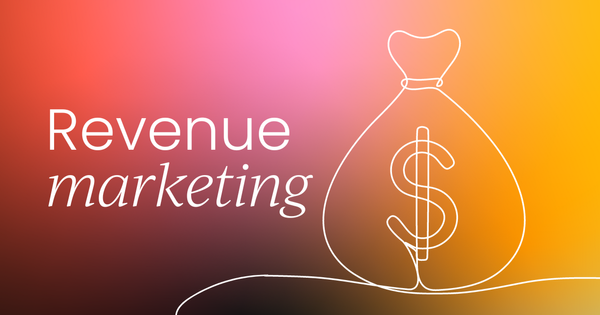Revenue marketing is an important strategy for businesses to drive growth and increase their bottom line. It utilizes sales tactics to generate leads, convert them into customers, and increase customer lifetime value (CLV).
Revenue marketing helps businesses understand their target audience better, create content that resonates with them, and boost their return on investment (ROI) through targeted campaigns.
This guide will provide you with an overview of revenue marketing, its benefits, and how you can use it to grow your business.
- What is revenue marketing?
- Benefits of revenue marketing
- Revenue marketing vs traditional marketing
- Transitioning from traditional marketing to revenue marketing
- The rise of revenue marketing
- Putting together a revenue marketing strategy
- Six tips to become a high-performing revenue-driven marketer
What is revenue marketing?
Revenue marketing is a marketing approach that focuses on delivering measurable results. It involves the use of data-driven tactics and strategies to identify, target and nurture leads, convert them into customers, and maximize CLV.
Revenue marketers measure the success of their campaigns by looking at how much revenue they generate and directly attribute that revenue to their marketing efforts. This approach enables companies to make decisions based on data rather than intuition or guesswork.
Revenue marketing aligns both the marketing and sales teams toward the common goal of generating revenue. Relying on a results-driven approach, it's all about measuring the results of marketing campaigns to improve them with a continuous feedback loop of data between marketing and sales.
By aligning sales and marketing, you can close more deals. Additionally, revenue marketing can provide you with better data for decision-making, so you can fine-tune your campaigns for even greater success.
Want to learn more about revenue marketing? You can check out this episode of our podcast, Let’s Talk Revenue Marketing, to hear from experts in the business outline the fundamentals of revenue marketing, and its progression.
What are the benefits of revenue marketing?
Here are the main ways that revenue marketing can bring true value to an organization:
Generates sales-qualified leads
Leads that come through revenue marketing efforts are often further along in the buyer’s journey than leads that come from, say, a cold-calling campaign.
This is because revenue marketing focuses on providing potential customers with the information they need to make an informed decision about your product or service. And as these leads are more informed, they’re also more likely to be ready to buy.
In other words, revenue marketing can help you generate sales-qualified leads – leads that are much more likely to convert into customers.
Attributes success to specific campaigns
Revenue marketing is all about attribution. Attributing success (or failure) to specific campaigns, rather than relying on generic measures such as web traffic or impressions.
The problem with conversion tracking is that it provides quite simplistic data. Whereas revenue attribution tracks the specific marketing actions and the impact they’re having further down the marketing funnel. It looks at the point at which something is generating revenue, and how much it creates.
This approach relies heavily on data and analytics. Revenue marketers use data to track the performance of their campaigns to identify areas where they can improve, allowing them to be highly effective in their campaigns and continue to improve over time.
It follows the customer journey from their first visit to your site, to the point where they make a purchase, allowing you to understand which lead generation activity generates the most revenue.
By attributing success to specific campaigns, revenue marketers can fine-tune their strategies and ensure their campaigns are as effective as possible.
Download the State of Revenue Marketing report to uncover the hidden secrets behind explosive revenue growth and harness the transformative power of your marketing efforts. 🔥
Aligns marketing and sales
Revenue marketing aligns marketing and sales departments by ensuring they work together to create cohesive campaigns that are designed to generate revenue. It can also improve the communication between these two departments, which is something that has long been an issue for sales and marketing.
When revenue is the focus, it can help to bring together two departments that often have different goals.
There are a few revenue marketing strategies that can help to align the marketing and sales departments, such as:
- Creating a revenue-based marketing plan: This type of plan focuses on generating revenue, rather than acquiring customers. It can help to bring together the goals of both departments and ensure that they're working towards the same goal.
- Focusing on quality leads: Revenue marketing is all about generating quality leads. By ensuring that the leads are high quality, it will be easier for the sales team to close deals.
- Implementing tracking and measuring results: In order to align the two departments, it’s important to track and measure the results of revenue marketing campaigns. This way, both teams will be able to see the direct correlation between their efforts and the revenue generated.
- Collaboration: Revenue marketing is only successful when both departments are working together closely. By collaborating and sharing ideas, it will be easier to create campaigns that are effective and generate results.
Increases customer focus
Revenue marketing has the customer at the forefront. When silos between sales and marketing are broken down, the business can create campaigns that are more customer-centric, allowing you to serve them better.
With a revenue marketing model, businesses can target their ideal buyers more effectively and generate warm leads for the sales team. Customers will also only receive relevant and personalized messaging, helping them move more quickly through the sales funnel.
Read more about how you can improve the customer journey with revenue marketing:

Revenue marketing vs traditional marketing
Metrics
There are a few key advantages to revenue marketing over a more traditional model. First, it allows businesses to track their progress in a more holistic way. In traditional marketing, businesses tend to focus on acquisition metrics like website traffic or the number of leads generated. While these metrics are still important, they don't paint the whole picture when it comes to your marketing efforts.
Revenue marketing allows you to track your progress in terms of actual revenue generated, and attribute it to specific marketing campaigns, which gives you a more accurate picture of your marketing ROI.
Customer-centric
Another advantage of revenue marketing is that it puts the customer first. In traditional marketing, businesses tend to focus on their own products and services rather than on the needs of their customers.
Revenue marketing, on the other hand, is all about understanding your customer's needs and pain points and then creating content that addresses those needs.
This customer-centric approach is more likely to result in long-term customers and repeat business.
Silos
In the traditional marketing model, marketing and sales work in silos whereby marketing works to generate leads and hands them off to sales. This is often where marketing’s involvement with those prospects ends.
With the revenue marketing model, both sales and marketing work together on their prospects from initial contact all the way through to the final sale. And this alignment can help generate up to 209% more revenue.
When marketing and sales work in silos, there can be a lot of tension and miscommunication. Marketing success is often measured by the number of leads over the quality of those leads, whereas sales are only interested in those ready to enter the sales pipeline.
A marketing team might track how well a piece of content performs, but they’ll never know if that generated traffic actually led to any sales.
By eliminating silos, you can optimize your sales and marketing teams’ effectiveness. You’ll be able to measure the impact on revenue that each marketing campaign generates, giving your marketing budget a higher ROI as you move towards campaigns that generate the most revenue. And the leads generated will be more qualified so sales can close them more quickly.
Transitioning from traditional marketing to revenue marketing
So, if you want to move away from traditional marketing and embrace all the benefits that revenue marketing can bring, how do you go about it? It’ll be a lot of work to start, but it has the potential to completely transform your business operations.
Strong company-wide commitment
You may think that it’ll be easy to get support from those in charge of a revenue marketing strategy. After all, what CEO wouldn’t want to see the marketing and sales team working together more efficiently toward revenue growth?
But there will be some roadblocks.
Change can be a daunting concept, especially if you’re trying to change the company’s entire way of working. There may also be a fear of a temporary drop if profits while the changes are underway.
KPIs for everyone are also likely to change within each role. Responsibilities will change as more collaboration is needed, and there may even be shifts in management.
Despite all these changes, everyone at the company needs to be fully on board, starting at the top with the CEO. When everyone knows what’s expected and has a clear vision for where the company is headed, it’ll make the transition just that much smoother.
Keep customers informed
Such a drastic change in processes will likely affect your customers too, as you’ll be making changes right across the funnel.
But as long as you keep them in the loop and are transparent about any changes, they shouldn’t have any issues. Keep communication open and let them know ahead of time how things are going to change and what they can expect.
Start aligning
Probably the most difficult step in implementing a revenue marketing strategy is getting your marketing and sales department in alignment. Building out these processes can be a challenge, especially with the two departments that are typically so at odds with each other.
But you need to break down those silos and get everyone in the same room to agree on KPIs and how they can move towards the revenue marketing model together.
Key things to establish include:
- Defining a sales-ready lead.
- How to qualify a lead.
- The ideal customer persona.
- The accounts that sales are interested in.
- The marketing materials that sales need to close deals.
Everyone in the company should be aligned but starting with marketing and sales is key for getting to grips with revenue marketing. Next will come customer support and customer success, which need a clear understanding of how they can collaborate to reach those revenue goals.
Fill organizational gaps
As you transition, you may notice you don’t have the right people at your company to implement revenue marketing, or the right people are in the wrong role.
It might be that sales and marketing report to different leaders, which can help exacerbate the silo problem. Or a lack of a dedicated data analyst in the marketing department might mean data isn’t being analyzed as thoroughly as it should.
Search for those organizational gaps and try to fill them with new hires or by shifting employees in their current roles to suit this new way of working.
MarTech stack
You likely already have a sizeable MarTech stack, so it’s time to review if it’s all fit for purpose.
Technology plays a huge role in revenue marketing. You’ll need a tool that can centralize as much as possible or a set of the best class of tools in each category that can be integrated.
Here’s a breakdown of what tools and systems you’ll need:
- Customer relationship management (CRM)
- Marketing automation
- Attribution
- Reporting
- Data connector
- Data Enrichment
It’s crucial that your data all syncs so everyone who needs it has access to a unified view of everything all in one place. Having these tools and collecting the right kind of data is essential for the revenue marketing model.
You’ll be able to see exactly what marketing activities have helped move more prospects through the tunnel, and which aren’t impacting your pipeline and should be discontinued.
Attribution
Attributing your marketing efforts to revenue is one of the cornerstones of revenue marketing, but can also be a huge pain point for the transition.
There are many touchpoints that someone can go through before they become a customer and different ways to measure this. It could be as simple as someone clicking through a paid ad and making a purchase.
But often it can be more complex, like a user subscribing to a newsletter and becoming a lead after a month when they sign up for a free trial.
Marketers will need to test multiple attribution models to discover which is the most accurate for their accounts. Only then can they focus their marketing efforts on the ones that bring in the most success, increasing revenue over time.
Is revenue marketing replacing traditional marketing?
Revenue marketing is a relatively new concept and is quickly replacing traditional marketing. It focuses on generating revenue directly for the business rather than simply creating awareness or engaging with customers.
Revenue marketing leverages data-driven insights, automation, and analytics to drive sales and increase CLV. It involves optimizing the customer journey to ensure maximum profitability while delivering a personalized experience.
Revenue marketing puts more emphasis on ROI than traditional marketing, making it more attractive to businesses.
For a closer look at traditional marketing vs revenue marketing, check out this article:

Putting together a revenue marketing strategy
Keen to get started with a revenue marketing strategy of your own? Here’s a quick guide to getting started.
Establish revenue goals
First, you need to establish your revenue goals. Without clear goals, you won’t have targets to reach when creating your campaigns. Your entire team will need to understand your revenue goals and how they can achieve them - so they need to be realistic and attainable.
Fortunately, we’ve got an article outlining the kind of revenue marketing KPIs you can set:

Analyze current results
With your goals in place, it’s time to look at where you are currently. Take a look at the results of your current marketing campaigns so you can develop them into a revenue marketing strategy. You’ll need a clear idea of what’s working and what isn’t, which strategies are producing the highest ROI/conversion rate/close rate.
Map out the customer journey
Develop a roadmap outlining the entire journey from initial contact to CLV. This roadmap will help illustrate all the different touchpoints customers use to engage with your brand and allow you to visualize that journey from start to finish. As a result, you’ll have a clearer idea of how to give your customers what they need at each stage, providing the ideal customer experience.
Optimize your tech stack
Successful revenue marketing requires MarTech that’s up to the task. You need the right kind of sales software with integrated marketing automation. This kind of software will help you gather the right data, providing you with insights into your sales, your customers, and how much revenue your sales and marketing campaigns are producing.

Six tips to become a high-performing revenue-driven marketer
Eric Ramos, Director of Analytics at BOL and the Founder of Kudoz, shared his six tips for becoming a high-performing revenue marketer.
As enterprises embrace the growing role of marketing in business growth, revenue has become a crucial metric to track. In response to this, revenue marketing has emerged as a strategy to gain growth while businesses bridge the gaps between the marketing and sales departments.
Now more than ever, executives demand that marketers demonstrate their role in business growth and revenue generation. This means that marketers must re-examine their efforts to demonstrate that their activities positively impact ROI.
Today, businesses that incorporate marketing operations, sales operations, and revenue operations report higher business growth compared to those still taking traditional approaches to sales and marketing.
One way to leverage teams to create a scalable marketing strategy is to become a revenue-driven marketer. A revenue driven-marketer works with data to prove the impact of marketing initiatives in attracting new leads, converting them into customers, and retaining their business. Here are six tips to help you harness your inner revenue-driven marketer
1. Learn how to develop marketing goals that increase revenue
Understanding your company’s revenue goals is the first step in establishing effective marketing goals. Goals defined in this way are actionable because you can attach a figure to them.
Knowing your company’s revenue goals also helps the revenue-driven marketer set useful KPIs to determine the impact of each marketing initiative.
Here are a few tips to keep in mind when developing marketing goals based on the overall business revenue goals:
- Identify the revenue you need to generate from your marketing efforts. For instance, if you need to grow revenue by 30%, you must establish how much the thirty percent represents and the timeline to achieve it.
- Determine the number of sales you need to meet the revenue goal.
- Identify the target close rate and opportunities you will need to achieve the revenue goal. Work backward from the goal. For example, if one customer brings in $1,500 per year, how many customers do you need to bring in $12,000?
- Identify the number of sales and market-qualified leads you need to reach your goals.
2. Plan and execute marketing campaigns that establish brand recognition, generate leads, and drive sales
Marketers often generate leads from new audiences who are unaware of the brand or the solutions offered. Alternatively, these audiences can be leads who already know about your products and have interacted with your content or bought from you previously.
Planning and executing a successful marketing campaign to generate leads and sales can be summarized in the following steps:
- Set a purpose for your campaign.
- Identify KPIs that will help you measure the progress of your marketing goals.
- Define your target audience based on their buying journey, pain points, where they are online, the kind of content they engage with, and the type of problems your product solves.
- Identify the marketing channels that you will use to meet various marketing goals.
- Determine the costs and budget for your marketing campaigns.
- Determine the type of content you will create for the marketing campaign, including the ideal content for each marketing channel you choose.
- Determine who will handle activities in the campaign (they can be employees or freelancers).
- Set a timeline for your campaigns.
3. Measure campaign results effectively
A revenue-driven marketer can demonstrate the impact of their marketing initiatives on a company’s revenue. This calls for setting and tracking the right metrics. Remember: Metrics + Inspiration = Revenue
Too often, marketers track vanity metrics, but they fail to look at more important metrics, such as the amount of revenue generated from engagement with content. Keep in mind, that content produced now may not generate leads immediately.
Instead, continue to consistently produce content geared toward the needs of your ideal client persona to ensure they know who you are, whether they’re ready to buy now, next month, or next year.
Metrics on campaign channels
Email marketing
If you’re sending out regular emails, some key performance indicators to track include open rates, click-through rates, and unsubscribe rates. These metrics tell you whether your emails are appealing enough for users to open and engage with them. In the case of unsubscribe rates, they can also tell you which content does not resonate with your audience.
Sales enablement
The metrics to track for your sales enablement process include the lead-to-customer conversion rate and the opportunity-to-customer conversion rate.
Product marketing
Product marketing metrics include adoption rates, conversion rates, and revenue. They tell you how much your audience is interacting with your content. Other metrics include organic traffic, return on marketing investment, referral traffic, customer acquisition cost, customer retention rates, and customer lifetime value.
4. Continuously optimize your marketing efforts
One significant way to achieve continuous optimization is by drawing actionable insights from data. Unlike looking at vanity metrics such as post likes, examining your data helps identify patterns and trends across various marketing channels.
Marketing optimization, especially using data, involves collecting data, cleaning data, analyzing the data, and implementing the insights you gain from that data. You can also use data to track a customer’s journey from their first contact with the organization to when they make a purchase.
5. Develop cohesive marketing strategies
Successful marketing rides on the collaboration between marketing, sales, and revenue teams. Through collaboration, an organization’s revenue, marketing, and sales efforts move in the same direction, ensuring consistency.
The benefits of adopting collaboration as part of a revenue-driven marketing strategy include:
- Marketing and sales teams deliver a consistent message and experience to customers. Consistency is key to delivering value-driven customer messaging and higher customer engagement rates.
- Increased revenue. When marketers and sales teams collaborate, they generate more efficient results by eliminating duplication and disjointed efforts.
- Developing buyer personas that match a company’s target audience to curate targeted sales and marketing messages.
6. Understand the trends and developments in your industry
The marketing space is constantly evolving. Whether it’s new technologies or marketing strategies, revenue-driven marketer always has to have their finger on the pulse of the industry. Being aware of trends and best practices in the industry enables you to launch competitive marketing strategies that bring in more leads and revenue to your business.
You can keep on top of trends by listening to top-rated podcasts, following marketing companies and marketers on LinkedIn, and reading reports and studies conducted in your industry.
While keeping up with these trends is important, it’s also crucial to diversify your marketing strategies so you’re not overly reliant on one tool. The goal is to continue to optimize strategies that work and test new ideas and technologies on a smaller scale.
In addition, by following the trends and developments in your industry, you will be able to hear how others have diversified their efforts and learn from their successes and failures before making your own efforts.
The art and science of revenue marketing
Becoming a revenue-driven marketer involves combining the artistic and scientific sides of marketing. It means being willing to look beyond the likes, shares, or leads your efforts have generated and focus on the positive ROI these leads have brought to the organization.
Becoming a revenue-driven marketer means understanding your company’s revenue goals and developing marketing strategies that drive growth and revenue to meet the objectives.
It also means working with data to draw insights into what efforts are working, how customers engage with the company, and the returns from marketing investments.
Become Revenue Marketing Certified
Step into the dynamic world of revenue marketing and unleash its power to transform the way you do business with Revenue Marketing Certified: Core.
Our course covers essential frameworks, templates, and insider secrets on leads and funnels, revenue growth, marketing campaigns, feedback loops, and team alignment.
By the end of this course, you'll:
🧠 Gain a deep understanding of the complexities and core aspects of revenue marketing.
👀 Know exactly how to implement your learning in your day-to-day work.
💪 Feel confident in using revenue marketing to grow your business.
📈 Create and improve your team’s alignment to boost your revenue-generating potential.
🚀 Learn how to blend marketing and sales roles to boost revenue.
⚒️ Cover crucial concepts like leads and funnels, team alignment, marketing channels, and revenue growth.
🔥 Discover why revenue marketing is a vital strategy for companies wanting to grow.



 Follow us on LinkedIn
Follow us on LinkedIn



